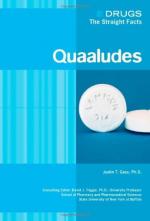|
This section contains 272 words (approx. 1 page at 300 words per page) |
This is a nonbarbiturate, short-acting SEDATIVE-HYPNOTIC drug that has been used to treat insomnia. It was originally introduced in 1951 as a treatment for malaria. In the 1960s and 1970s, it became a popular drug of abuse among college students. Frequently called Quaaludes or "Ludes," the drug, like the shortacting BARBITURATES, produced euphoric effects; some users claimed it had APHRODISIAC effects.
 Figure 1 Methaqualone
Figure 1 Methaqualone
It is usually taken in pill form, and depending on the dose, the effects last a few hours. The body eliminates about half of the ingested dose in about ten to forty hours, so that even forty-eight hours after ingestion, some drug may still be present. Prolonged use of methaqualone in high doses can lead to TOLERANCE AND PHYSICAL DEPENDENCE, and abrupt cessation of daily ingestion can result in WITHDRAWAL symptoms that are quite similar to those seen in barbiturate withdrawal. Fatal convulsions have resulted from sudden withdrawal. Fatal overdoses can occur when the drug is used alone, but especially when it is mixed with ethanol (ALCOHOL) and/or barbiturates. Because it was so commonly abused in the United States, the drug was shifted to Schedule I of the CONTROLLED SUBSTANCES ACT in the 1980s. Thus, it can no longer be prescribed and its nonmedical use is subject to severe criminal penalties. Although it is rarely used illicitly in the United States, it is still available in other countries and is a drug of abuse in some.
See Also
Addiction: Concepts and Definitions)
Bibliography
HARVEY, S. C. (1980). Hypnotics and sedatives. In A. G. Gilman et al. (Eds.), Goodman and Gilman's the pharmacological basis of therapeutics, 6th ed. New York: Macmillan.
|
This section contains 272 words (approx. 1 page at 300 words per page) |


